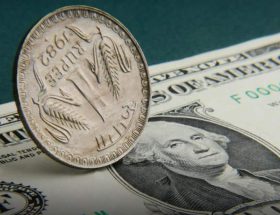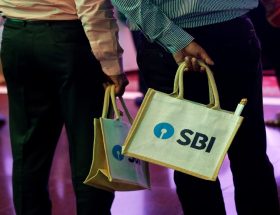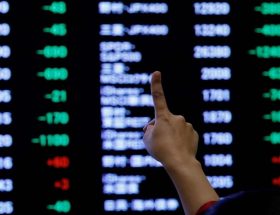
US stocks end higher amid upbeat earnings; analysts caution investors against chasing the rally
US stocks closed higher following a sudden pullback in tech shares, with investors assessing the latest round of upbeat earnings against a backdrop of growing concerns over slowing growth and rising borrowing costs. The S&P 500 managed to post modest gains in a roller-coaster session that included a sharp downturn after the index failed to push above its 200-day moving average. The tech-heavy Nasdaq-100 ended lower, while the Dow Jones Industrial Average kept its leadership role among major benchmarks, rallying 0.7%.
Equity markets seesawed in a session marked by steep losses and gains. Treasuries stayed lower, with short-dated yields, the most sensitive to interest-rate changes, up more than five basis points. Stocks started the day on the back foot as investors weighed the latest mixed economic data with the Federal Reserve on the path of hiking interest rates. Data Tuesday showed a bigger-than-expected drop in US home construction, while production at US factories increased in July for the first time in three months.
Stocks gained traction later as risk sentiment got a boost from Walmart Inc. exceeding Wall Street’s diminished profit expectations and modestly improving its full-year forecast, while Home Depot Inc. posted results that beat estimates even as the US housing market shows signs of cooling off. Those results helped spur gains in a swath of retailers, including the Target Corp. and Lowe’s Cos. ahead of their earnings due Wednesday.
“The move lower in the last hour is mostly technical — once the S&P 500 got to its 200-day moving average, the rally began to be exhausted and short sellers challenged the upward momentum,” Joe Gilbert, portfolio manager for Integrity Asset Management. “Realistically, at this level the market is range bound because there is still a fair amount of uncertainty as to how the Fed will perceive the most recent economic data in the prism of likely economic outcomes. The market is not confident enough to break out above this range with so many unknowns.”
Reports Monday showing a sharp drop in New York state manufacturing along with the longest streak of declines since 2007 in homebuilder sentiment sparked optimism in equity markets that the Fed may slow interest-rate hikes. The S&P 500 has rallied 17% from its mid-June nadir, fueled in part by traders dialing back wagers on rate hikes and speculation that inflation has peaked.
“We would caution investors against chasing this rally,” Mark Haefele, chief investment officer at UBS Global Wealth Management, said. “We expect renewed market volatility ahead, and we continue to recommend positioning portfolios for resilience under various scenarios. With inflation still high, we favor value stocks including global energy. And with the economic outlook uncertain, we think investors can consider defensive equity exposure via global healthcare or quality income stocks.”
Clues on how sensitive the Fed is to unfolding economic data may be known when the minutes of the last meeting of the Federal Open Market Committee is released on Wednesday. However, the big event investors are waiting for is the annual monetary policy symposium at Jackson Hole, Wyoming during Aug. 25-27. Traders are bracing for higher volatility until then.
More market commentary
“I like consumer discretionary,” Brad McMillan, chief investment officer at Commonwealth Financial Network, said on Bloomberg Radio. “As inflation goes down, consumer confidence is going to come back.” The Walmart data “is something that says, ‘yeah, that may be starting to happen.’ I think tech is also a good place going forward. Play on growth, play on the consumer.”
“The equity market drawdown has been primarily rates led, earnings weakness is next,” says Seema Shah, chief global strategist at Principal Global Investors, in a note. “A near-term bear market rally is possible as Fed rate expectations settle and inflation peaks. However, with margin pressures growing and demand weakening, earnings concerns are mounting so a sustained rebound is unlikely.”
Also Read: Better salary hikes coming in 2023: Indian firms could hand out highest pay raise in APAC as business grows
“The idea of a soft landing is a bit of a fairy tale at this point given how extreme inflation levels are,” David Schassler, head of quantitative investment solutions at VanEck, said by phone. “Historically speaking, when the government’s been forced to fight inflation at these levels, bad things have happened.”
Key events to watch this week
Federal Reserve July minutes, WednesdayNew Zealand rate decision, WednesdayUK CPI, US retail sales, WednesdayAustralia unemployment, ThursdayU.S. existing home sales, initial jobless claims, Conference Board leading index, ThursdayFed’s Esther George, Neel Kashkari speak at separate events, ThursdaySome of the main moves in markets:
StocksThe S&P 500 rose 0.2% as of 4 p.m. New York timeThe Nasdaq 100 fell 0.2%The Dow Jones Industrial Average rose 0.7%The MSCI World index was little changedCurrenciesThe Bloomberg Dollar Spot Index was little changedThe euro was little changed at $1.0170The British pound rose 0.3% to $1.2095The Japanese yen fell 0.6% to 134.18 per dollar
BondsThe yield on 10-year Treasuries advanced three basis points to 2.81%Germany’s 10-year yield advanced seven basis points to 0.97%Britain’s 10-year yield advanced 11 basis points to 2.13%
CommoditiesWest Texas Intermediate crude fell 3.2% to $86.56 a barrelGold futures fell 0.4% to $1,790.80 an ounce








